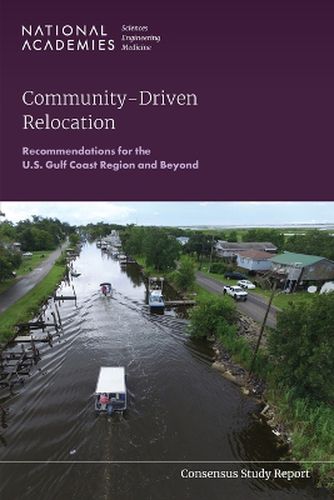Readings Newsletter
Become a Readings Member to make your shopping experience even easier.
Sign in or sign up for free!
You’re not far away from qualifying for FREE standard shipping within Australia
You’ve qualified for FREE standard shipping within Australia
The cart is loading…






Between 1980 and mid-2023, 232 billion-dollar disasters occurred in the U.S. Gulf Coast region, with the number of disasters doubling annually since 2018. The variety and frequency of storms have exacerbated historic inequalities and led to cycles of displacement and chronic stress for communities across the region. While disaster displacement is not a new phenomenon, the rapid escalation of climate-related disasters in the Gulf increases the urgency to develop pre-disaster policies to mitigate displacement and decrease suffering. Yet, neither the region nor the nation has a consistent and inclusionary process to address risks, raise awareness, or explore options for relocating communities away from environmental risks while seeking out and honoring their values and priorities.
Community-Driven Relocation: Recommendations for the U.S. Gulf Coast Region and Beyond examines how people and infrastructure relocate and why community input should drive the planning process. This report provides recommendations to guide a path for federal, state, and local policies and programs to improve on and expand existing systems to better serve those most likely to be displaced by climate change.
Table of Contents
Front Matter Summary 1 Introduction 2 The Scale of the Threat 3 Examples of Relocation 4 Understanding the Gulf Region: Historical Context 5 Current Realities of the Gulf Coast 6 Sustaining Community Well-Being: Physical, Mental, and Social Health 7 Communication, Participation, and Knowledge 8 Receiving and Originating Communities 9 Landscape of Policy, Funding, and Planning 10 Challenges and Opportunities for Policy 11 Recommendations for Community-Driven Relocation Efforts in the Gulf Region and Beyond References Appendix A: Committee Members Appendix B: Public Info Session Participants Appendix C: Community Profiles Appendix D: Key Terms Appendix E: Gulf Coast Timeline
$9.00 standard shipping within Australia
FREE standard shipping within Australia for orders over $100.00
Express & International shipping calculated at checkout
Stock availability can be subject to change without notice. We recommend calling the shop or contacting our online team to check availability of low stock items. Please see our Shopping Online page for more details.
Between 1980 and mid-2023, 232 billion-dollar disasters occurred in the U.S. Gulf Coast region, with the number of disasters doubling annually since 2018. The variety and frequency of storms have exacerbated historic inequalities and led to cycles of displacement and chronic stress for communities across the region. While disaster displacement is not a new phenomenon, the rapid escalation of climate-related disasters in the Gulf increases the urgency to develop pre-disaster policies to mitigate displacement and decrease suffering. Yet, neither the region nor the nation has a consistent and inclusionary process to address risks, raise awareness, or explore options for relocating communities away from environmental risks while seeking out and honoring their values and priorities.
Community-Driven Relocation: Recommendations for the U.S. Gulf Coast Region and Beyond examines how people and infrastructure relocate and why community input should drive the planning process. This report provides recommendations to guide a path for federal, state, and local policies and programs to improve on and expand existing systems to better serve those most likely to be displaced by climate change.
Table of Contents
Front Matter Summary 1 Introduction 2 The Scale of the Threat 3 Examples of Relocation 4 Understanding the Gulf Region: Historical Context 5 Current Realities of the Gulf Coast 6 Sustaining Community Well-Being: Physical, Mental, and Social Health 7 Communication, Participation, and Knowledge 8 Receiving and Originating Communities 9 Landscape of Policy, Funding, and Planning 10 Challenges and Opportunities for Policy 11 Recommendations for Community-Driven Relocation Efforts in the Gulf Region and Beyond References Appendix A: Committee Members Appendix B: Public Info Session Participants Appendix C: Community Profiles Appendix D: Key Terms Appendix E: Gulf Coast Timeline